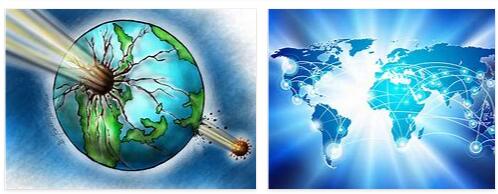
Innovative companies are pushing their way onto the world market with new products at ever shorter intervals in order to be able to survive in the innovation and time competition. The shortening of product life cycles, the interdependencies of new technologies and the constant increase in research and development expenditures also increase the incentive for global cooperation. The trend towards the increasing enforcement of internationally valid norms and standards in the capital goods sector facilitates the development of new technologies and also enables more intensive service and delivery interdependencies between end product manufacturers and their globally dispersed suppliers.
The globalization of markets means increasing integration in the sense that originally nationally segmented and isolated markets are increasingly merging into uniform world markets. This applies to both the sales and procurement markets for financial, physical and human capital as well as the specific markets for information and knowledge. The most advanced is the global integration of the financial markets, which have become more and more disconnected from the real economic sphere of the goods and services markets.
Globalization of competition: Globalization of competition means, on the one hand, an intensification of the competition between individual companies in global sales markets and, on the other hand, competition between individual countries and regions for mobile production factors.
The integration of hitherto uninvolved countries in world trade, cross-border capital movements and technology transfer resulted in a horizontal integration of the world economy, which has considerably intensified international competition on goods and factor markets. However, new providers from developing, emerging and transition countries have not only created new competitors, but also sales opportunities in new markets, whose increasingly affluent demand has to be served with suitable products.
The globalization of the economy is also manifesting itself as a competition between locations, in which states and regions compete for internationally mobile, complementary production factors such as capital and knowledge. Critics fear that this intensified competition between locations for mobile capital will lead to concessions on the part of the states in taxes and social security contributions and thus gradually undermine the welfare state foundation. You are therefore calling for international agreements on tax harmonization. However, the opponents of this demand see nothing more than a restriction of competition between locations by political cartels.
Globalization of the labor market: The structural change in production and employment that goes hand in hand with globalization and rapid technical progress have considerable effects on national labor markets. In Germany and other European countries, the rationalization efforts of the companies competing globally were associated with a continuous reduction of jobs.
Furthermore, global companies contribute to job cuts as soon as they move to low-wage regions. Human capital that already exists there and the intercontinental transport of information cause them to make their choice of location “globally” anew. H. to outsource production to low-wage countries. This can involve the step from the previously usual complementary foreign investment of certain production stages to the complete outsourcing of the company. While the former can still stabilize the domestic employment situation, the outsourcing of employment is finally withdrawn and leaves behind social costs. Modern welfare states therefore find it difficult to maintain their standards. B. in comparison with the »Third World« to negative factors. In the course of globalization and world social imbalances, national labor markets are therefore coming under pressure.
According to bestitude.com, globalization and technological change are not to blame for the lack of jobs alone, because there are also massive domestic employment problems.
Political Aspects
In addition to the nation state, which is based on the fundamental principles of autonomy, sovereignty and territoriality, supranational and regional political units are establishing themselves. At the supranational level, global policy areas such as B. Climate protection, biological diversity, human health and security, peace and financial stability, which can no longer be mastered by individual governments alone. In addition to national and international actors from politics and business, there are also global associations and networks of other social actors (Attac, World Social Forum). The main sponsors are non-governmental organizations (NGO), which inter alia. Enforced the ban on anti-personnel mines and the establishment of the International Criminal Court.
Regional associations are also a political characteristic of globalization; apart from the EC / the EU (European Union) z. B. NAFTA (North American Free Trade Association), ASEAN and Mercosur. The internationalization of political-economic structures is accelerated by globalization, because economic and monetary communities come under pressure to react, which come from equal and emerging economic powers. This weakens the nation-state as a decision-making unit and popular sovereignty as decision-makers in modern democracies and creates resistance.